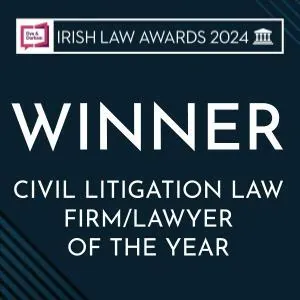
07/06/2021 by doyleadmin
Supreme Court issues ‘very significant’ ruling on right of parents and children
Supreme Court issues ‘very significant’ ruling on right of parents and children
Supreme Court issues ‘very significant’ ruling on right of parents and children
Published 26 January 2021
The Supreme Court has issued a “very significant” ruling in a case focusing on the medical treatment of an 11-year-old boy who suffered life-changing neurological injuries.
chilrens rights
The Irish Human Rights and Equality Commission submitted to the court that any decision in respect of the boy’s treatment had to be made in a manner that balanced and protected his constitutional rights as a child, with due regard to the rights of his parents. The Commission also queried whether the decision to make him a ward of court was a proportionate interference with his rights in circumstances where, the Commission argued, removed decision-making capacity from his parents.
The Supreme Court has ruled that a hospital may withhold life-sustaining treatment for a catastrophically injured child against the wishes of his parents.The court considered that the best interests of the child did not require the hospital to perform aggressive and invasive life-sustaining procedures because there was no realistic benefit to the boy except continued pain and suffering.
Background
The young boy suffered catastrophic brain injuries in July 2020 in an accident. He was brought to the Hospital and admitted to the Paediatric Intensive Care Unit. It was not expected that he would ever walk, talk, develop any meaningful awareness of his surroundings, be able to communicate or process information, or be capable of performing any voluntary movement. The uncontested medical opinion was that the brain injuries were permanent and irreversible.
One of the effects of John’s condition was dystonia, which is the painful, prolonged and involuntary contraction of John’s muscles. The Hospital was concerned that the medication doses required to control John’s dystonia might terminate his ability to breath and he would require further treatment in the PICU.
The parents argued that John would want to fight for life at any cost and just needed more time.They refused to consent to medical treatment which may cause John to stop breathing. In this context, the Hospital brought an application to the High Court seeking orders to withhold certain life-sustaining treatments and to administer medication to John even if the secondary effect was that John’s respiratory system would fail.
The case was originally commenced in the High Court under the wardship procedure, where the President of the High Court, made John a ward of court and granted the reliefs sought by the Hospital. Subsequently, the parents appealed the decision to the Supreme Court.
Supreme Court
The Supreme Court considered several distinct submissions made by the parties, including the appropriateness of the warship procedure, whether the withholding of treatment amounted to euthanasia, and the best interests of the child.
Wardship
The parents had argued that it was not appropriate to use the wardship jurisdiction to make orders and claimed that plenary proceedings were the proper procedural action. The Court rejected this, stating that the wardship process was no less appropriate than plenary proceedings seeking declarations.
The court accepted it was generally not desirable for wardship to usurp the entire decision-making function of the parents in single-issue cases. Despite this finding, the court ruled that the wardship was sufficiently flexible to only encroach minimally on John’s life.
Euthanasia
The parents also contended that the orders sought by the Hospital in the case were constitutionally impermissible because they amounted to an acceleration of death and/or euthanasia. The Court rejected this submission, noting that the doctors were advocating for a move to palliative treatment rather than a deliberate act to end John’s life.
The court then turned to what it described as the central issue in the case, namely; whether the conscientious decisions of parents regarding treatment can be overridden when the consequence may be the potential death of their child. The court noted that Article 42A of the Constitution allowed the State to intervene if the parents failed in their duty to the child to the extent that the welfare of the child was prejudicially affected.
Critically, the court determined that, contrary to pre-Article 42A case law, the blameworthiness of the parents was no longer an essential feature of “parental failure” for State intervention, and that this failure need not amount to a complete abandonment of the parental role. The best interests of the child were the paramount consideration.
The parents’ consent to medical treatment was not solely an issue of family authority but rather an exercise in vindicating the rights of the child. The court acknowledged that court approval is prudent in disputed cases between parents and doctors.
Decision and conclusion
The court said the primary legal issue in the case was whether it was lawful for the Hospital to withhold medical treatment rather than whether the parents consented to same. The Hospital did not require the consent of the parents to withhold treatment but did require consent to administer the dystonia medicine which may have stopped John from breathing.
In light of the medical evidence in the case and giving weight to the parent’s position, the court reluctantly concluded that the refusal to assent to pain-relieving treatment for a dystonic episode was a failure of duty by the parents.
The court agreed that the orders regarding John’s treatment could be made on a contingent basis. The court ordered that the Hospital could administer such medications as might be necessary to stop dystonic episodes even if it resulted in the termination of John’s respiratory system. The court declined to approve the other orders from the High Court regarding John’s treatment because there was no indication that these treatments were in issue or that the parents would not consent to them. As such, the High Court decision was affirmed and the appeal was dismissed.
It is clear that this ruling is a very significant one in respect of the rights of parents and their children under the Constitution.


